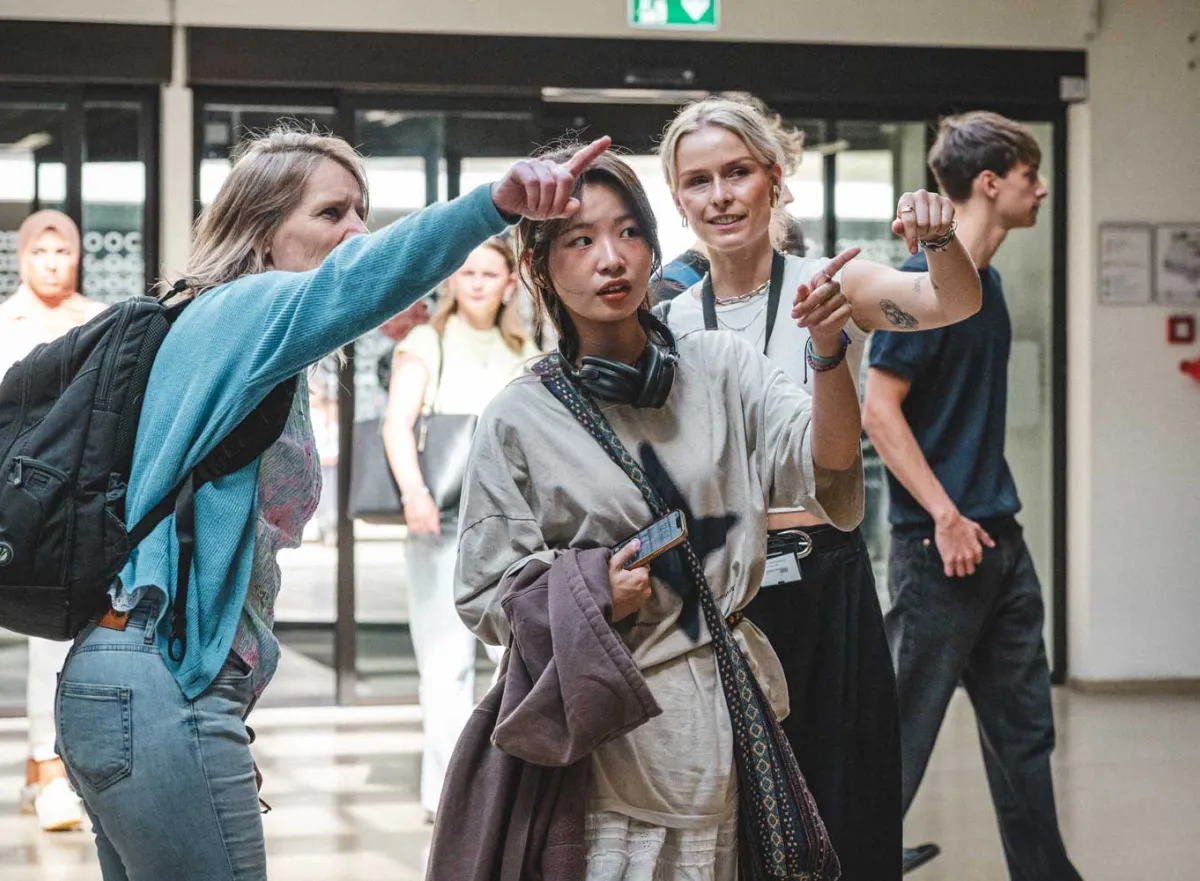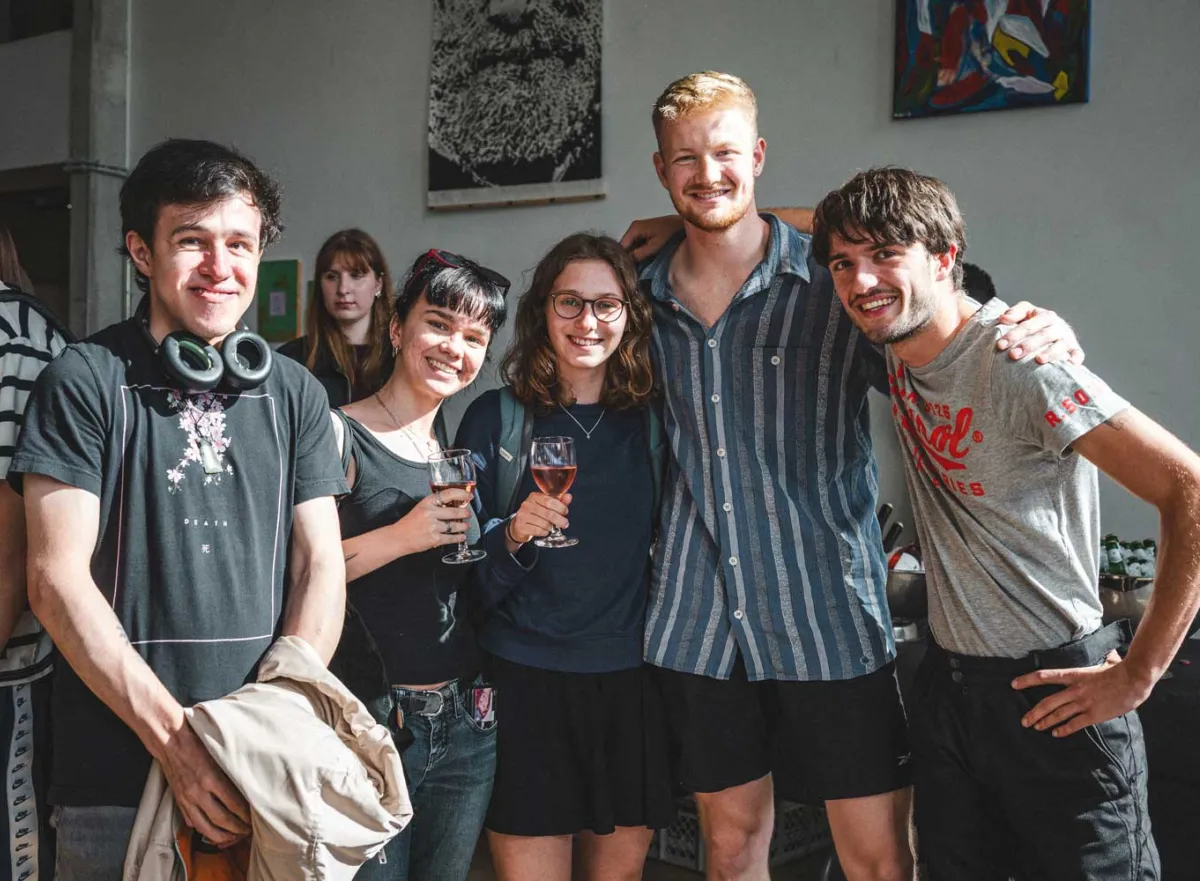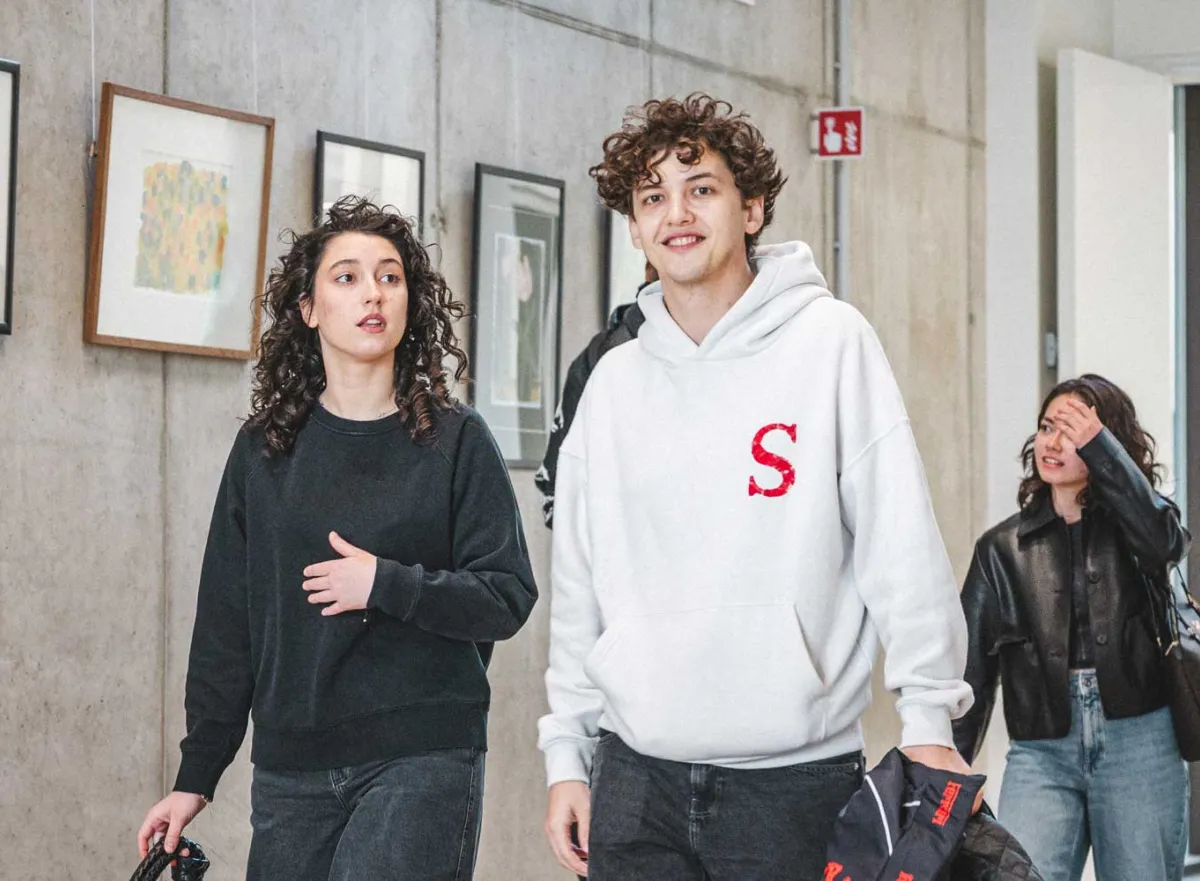Exchange programme
- English-taught exchange programme in Europe, focused on business, sustainability and innovation.
- Join for one semester (autumn or spring) and earn 30 credits.
- Work on real cases, projects and company visits that link theory to practice.
- Explore the UN Sustainable Development Goals (SDGs), the circular economy, and social entrepreneurship.
- Learn how to drive innovation and manage change within organisations.
- Grow your personal leadership and intercultural skills to make real impact.
- Study in Belgium and connect with classmates from across the globe in an international classroom.
More questions?
incoming.mit@kdg.be
What does this course contain?
Course in brief
In this exchange track you combine business management with a clear focus on sustainability and innovation. Courses, cases and company visits are carefully sequenced to help you build knowledge step by step.
- Work with sustainability frameworks such as the UN Sustainable Development Goals (SDGs), the 3Ps (People, Planet, Profit) and the circular economy.
- Explore the strategic role of HR, supply chains and data in creating sustainable impact.
- Apply research and data analysis tools (including AI) to measure and report on sustainability performance.
- Develop future-proof business strategies, making informed choices in complex, real-world contexts.
- Practice innovation and change management, using design thinking, co-creation and intrapreneurship.
- Strengthen your personal leadership: reflect on your values, build resilience, and learn how to empower international teams.
- Bring it all together in a series of business cases, gradually moving from smaller projects to a large final case where you demonstrate your impact.
Course overview
- You can register for a minimum of 20 credits and a maximum of 30 credits per semester.
- To shape your individual exchange study programme, please contact us at incoming.mit@kdg.be.
Mandatory courses
Sustainable Business & Economics Fundamentals
(
3 credits
)
You will learn how sustainability drives business:
- You will work with sustainability frameworks such as the Sustainable Development Goals (SDGs), the 3Ps (People, Planet, Profit), and the Corporate Sustainability Reporting Directive (CSRD).
- You will examine sustainability from a historical perspective and within the geopolitical context of a globalized world.
- You will explore new economic models, including the circular economy, regenerative economy, and social entrepreneurship.
Sustainable Business & Economics Advanced
(
3 credits
)
You will dive into several specific business aspects:
- HR as an integral part of a sustainability strategy.
- We explore the strategic role HR can play in a sustainable enterprise.
- We delve into HR solutions and work hands-on with them.
- The supply chain plays a key role in sustainability. By understanding and recognizing the role of supply management and logistics, you will actively apply this knowledge.
- Other current and impactful topics are also covered in this module.
Applied Business Research & Data
(
3 credits
)
You will learn about methods to critically consult and assess different types of information sources. It is about gathering, validating, measuring and processing data to develop insights, strategies and appropriate actions, and reporting about sustainability parameters. You will be able to make the right calculations and decisions with the support of tools (e.g. AI).
Future-Proof Business Strategy
(
3 credits
)
You support the development of concrete business options and setting up the right priorities in the surrounding business ecosystem. This means that you consider different business models, gather and process inputs of relevant stakeholders (e.g. customers, suppliers,…). You will be able to distinguish between different options and make informed choices as a consultant and ambassador for the initiatives you are involved in.
Innovation Management
(
3 credits
)
Within sustainability it is of big importance to know how innovation can play a role in a business transformation process. You will need to solve specific problems within a company by using iterative techniques (e.g. product & service design thinking, co-creation) and process development. We immerse you in the trends, successes and failures of new technologies and what to integrate in the context of sustainability. The principles of intrapreneurship will help you to see and combine different perspectives to develop structural and impactful actions. You will apply your knowledge in real cases, explored in a multidisciplinary setting.
Change Management
(
3 credits
)
You will learn the basic principles of change management and what makes it part of sustainability. You will not only be able to understand the different parts of change but will also be able to enable change in different parts of an organisation, team and company. As a change manager you need to listen, to understand, formulate clear goals, empower and motivate colleagues and other stakeholders involved. You keep the overview and bring in knowledge that is needed to get through the never-ending journey. You will have to cope with successes and failures throughout the process. Project and time management will be essential to analyze structural patterns in an organization.
Personal Leadership
(
3 credits
)
This course is about fostering personal growth and self-awareness, encouraging reflection on values, beliefs, and emotions, and promoting the development of critical thinking skills to cultivate a deeper understanding of oneself and the world around them. This to become resilient, empathetic, and socially responsible in the business context and beyond. We explore how to use talents and authentic leadership to make international and intercultural teams work in a business and the current world context.
Business Cases
(
9 credits
)
The theory and knowledge that you will gain during the different course units will come together and will be deepened during a series of cases, closely connected to different sustainability topics and specific sectors. The cases will both be conducted individually and in groups and will gradually evolve in complexity over the track. At the end of the semester you will be immersed in a complex case where you have to demonstrate in thinking and doing what you have learned and personally integrated to create impact within the topic of sustainability.
Language course (optional)
Dutch Foreign Language for Beginners
(
3 credits
)
This course will help you to develop your skills in Dutch, the language spoken in the Netherlands and in Flanders. The learning objective is to reach level A1 of the CEFR for languages: understand and use familiar everyday basic phrases, introduce yourself and others, interact in a simple way provided the other person talks slowly and clearly and is prepared to help. However, students who are fluent in German tend to learn Dutch very fast and can reach an A2 level in one semester and will have the chance to do so. You’ll learn about the culture of Antwerp and Belgium, you’ll recognize grammatical structures (A1) and use them (A2), you’ll develop your vocabulary, listening and speaking skills and you can choose between a more interactive and fun approach or a more classical approach focusing on grammar and vocabulary.
Mandatory courses
Sustainable Business & Economics
(
6 credits
)
During this course unit you will learn about the different sustainability frameworks (e.g. SDGs, 3Ps, CSRD..) and how this topic is situated in a historical context and as part of geopolitics in our globalized world. Next to the general principles we focus on system thinking and new economic models like circular economy, regenerative economy, social entrepreneurship, etc. In the advanced module you will learn how this applies to different domains eg HR, Logistics...After this course unit you will have a profound knowledge about how sustainability drives business today and tomorrow.
Applied Business Research & Data
(
3 credits
)
You will learn about methods to critically consult and assess different types of information sources. It is about gathering, validating, measuring and processing data to develop insights, strategies and appropriate actions, and reporting about sustainability parameters. You will be able to make the right calculations and decisions with the support of tools (e.g. AI).
Future-Proof Business Strategy
(
3 credits
)
You support the development of concrete business options and setting up the right priorities in the surrounding business ecosystem. This means that you consider different business models, gather and process inputs of relevant stakeholders (e.g. customers, suppliers,…). You will be able to distinguish between different options and make informed choices as a consultant and ambassador for the initiatives you are involved in.
Innovation Management
(
3 credits
)
Within sustainability it is of big importance to know how innovation can play a role in a business transformation process. You will need to solve specific problems within a company by using iterative techniques (e.g. product & service design thinking, co-creation) and process development. We immerse you in the trends, successes and failures of new technologies and what to integrate in the context of sustainability. The principles of intrapreneurship will help you to see and combine different perspectives to develop structural and impactful actions. You will apply your knowledge in real cases, explored in a multidisciplinary setting.
Change Management
(
3 credits
)
You will learn the basic principles of change management and what makes it part of sustainability. You will not only be able to understand the different parts of change but will also be able to enable change in different parts of an organisation, team and company. As a change manager you need to listen, to understand, formulate clear goals, empower and motivate colleagues and other stakeholders involved. You keep the overview and bring in knowledge that is needed to get through the never-ending journey. You will have to cope with successes and failures throughout the process. Project and time management will be essential to analyze structural patterns in an organization.
Personal Leadership
(
3 credits
)
This course is about fostering personal growth and self-awareness, encouraging reflection on values, beliefs, and emotions, and promoting the development of critical thinking skills to cultivate a deeper understanding of oneself and the world around them. This to become resilient, empathetic, and socially responsible in the business context and beyond. We explore how to use talents and authentic leadership to make international and intercultural teams work in a business and the current world context.
Business Cases
(
9 credits
)
The theory and knowledge that you will gain during the different course units will come together and will be deepened during a series of cases, closely connected to different sustainability topics and specific sectors. The cases will both be conducted individually and in groups and will gradually evolve in complexity over the track. At the end of the semester you will be immersed in a complex case where you have to demonstrate in thinking and doing what you have learned and personally integrated to create impact within the topic of sustainability.
Language course (optional)
Dutch Foreign Language for Beginners
(
3 credits
)
This course will help you to develop your skills in Dutch, the language spoken in the Netherlands and in Flanders. The learning objective is to reach level A1 of the CEFR for languages: understand and use familiar everyday basic phrases, introduce yourself and others, interact in a simple way provided the other person talks slowly and clearly and is prepared to help. However, students who are fluent in German tend to learn Dutch very fast and can reach an A2 level in one semester and will have the chance to do so. You’ll learn about the culture of Antwerp and Belgium, you’ll recognize grammatical structures (A1) and use them (A2), you’ll develop your vocabulary, listening and speaking skills and you can choose between a more interactive and fun approach or a more classical approach focusing on grammar and vocabulary.
Exams and re-sits
- Regular exams take place on campus in Antwerp.
- Resits are scheduled between 16 and 31 August.
- Resit exams/evaluations are held online.
When?
Autumn Semester 2025
- Welcoming Days: 11 – 12 September
- Course modules term 1: 15 September – 24 October
- Deadline changes: To be decided
- Half term holidays (1 week): 27 October – 2 November
- Examinations: 3 November – 7 November
- Course modules term 2: 10 November – 19 December
- Farewell event: To be decided
- Seasonal holidays (2 weeks): 22 December – 4 January
- Examinations: 5 January – 23 January
- End of semester: 23 January
- Resit: 17 – 28 August (online)
Spring Semester 2026
- Welcoming Days: 29 – 30 January
- Course modules term 3: 2 february – 20 March
- Deadline changes: To be decided
- Half term holidays (1 week): 16 – 22 February
- Examinations: 23 – 27 March
- Course modules term 4: 30 March – 22 May
- Seasonal holidays (2 weeks): 6 April – 19 April
- Farewell event: To be decided
- Study week (no classes): 25 May – 29 May
- Examinations: 1 June – 19 June
- End of semester: 19 June
- Resit: 17 – 28 August (online)
Welcoming days
- Autumn 2025: 11-12 September 2025
- Spring 2026: 29-30 January 2026
Joining the Welcoming days is mandatory and key to a successful exchange.
What to expect?
- We will introduce you to campus life, explain your daily routine and show you more of Antwerp.
- Get to know your way around all things KdG.
- Meet your classmates and potential new best friends.
- Start to feel at home and comfortable for your first KdG classes.
Detailed program will be shared via e-mail.


Study in Antwerp, Belgium
- Home to around 50,000 students and more than 170 nationalities.
- Antwerp is a safe, diverse and welcoming international student city.
- Situated on the River Scheldt, this mini metropolis is a gateway to the world.
- A perfectly located economic hub steeped in history, and always evolving.
- Brussels, Amsterdam, Paris and London all within easy reach.
Want to get a taste of student life at KdG? Follow us on Instagram!
Your main campus
- Your main campus is our Groenplaats campus in the heart of Antwerp, overlooking the the main square and cathedral, and near the Meir shopping street.
- You will occassionally have classes at one of our other campuses: Stadswaag, Pothoek, or Zuid.
- Study in the library, get together for group work, or relax in the coffeebar in any of the KdG campuses.
- Excellent bus and tram links make getting around easy. Antwerpen-Centraal station is close by, connecting you to Brussels, Amsterdam, Paris, and London.
Campus Groenplaats
Nationalestraat 5
2000 ANTWERP
+32 3 613 16 00
info.mit@kdg.be
Practical information
Student onboarding (all the essential information you need)
Guidance and support
- You are not alone. KdG staff are here to support you with your studies.
- Students with special needs can apply for individual measures, which are set down in an 'Individual Learning Certificate' (ILC). The granting of these allows for certain concessions in your education and evaluation.
- Your mental wellbeing is important for us. More about guidance and support at KdG.
Apply
Who can apply?
- We welcome all incoming students in Business Administration and Commercial Sciences & Management warmly and look forward to having you join us.
- Some more specialised courses require preliminary knowledge or skills in International Business Management.
- Only students selected in the framework of an Interinstitutional Agreement can be accepted.
English language requirements
- English level B2 recommended for active participation in courses.
- Limited English proficiency may increase the risk of failing assignments and exams; responsibility of the sending institution.
- Optional language lessons available on your own expense at the language center of the University of Antwerp (Linguapolis). Applications and fees are to be arranged directly with Linguapolis.
How to apply?
- Ask your home institution to communicate your nomination to our international incoming coordinator via our nomination form. You can request the link via incoming.mit@kdg.be.
- When you are accepted, you will receive an e-mail confirming your nomination and a link to our online registration and course selection.
- When your courses have been approved by KdG, you will receive the link to Mobility Online where you can complete the rest of your application.
Deadlines
- 1st semester (Autumn semester):
- Nomination deadline: 1 May
- Application deadline: 30 June
- 2nd semester (Spring semester):
- Nomination deadline: 1 November
- Application deadline: 22 December
 Karel de Grote Hogeschool
Karel de Grote Hogeschool

